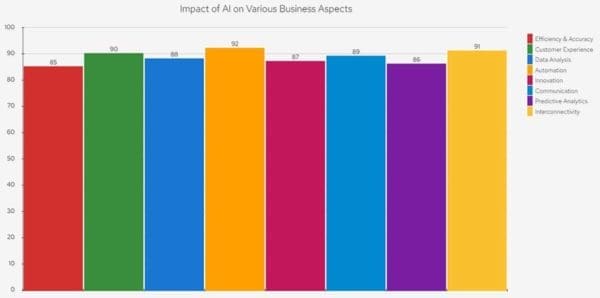Why AI is Important for Business
What is Artificial Intelligence (AI)?

Brain combined with artificial intelligence
Artificial Intelligence (AI) refers to the development of computer systems that can perform tasks that would typically require human intelligence. These systems are designed to analyze and interpret data, learn from it, and make decisions or perform actions based on that information. AI has the potential to revolutionize various industries, including business.
How can AI benefit businesses?
AI technology offers numerous benefits for businesses. It can automate repetitive tasks, increase efficiency, and improve overall productivity. AI algorithms can quickly analyze large amounts of data and provide valuable insights for business decision-making. Additionally, AI-powered chatbots can enhance customer experience by providing instant responses and personalized interactions.
How is AI transforming the business landscape?
AI is transforming the business landscape by introducing automation and streamlining processes. It enables businesses to optimize their operations and reduce costs by automating tasks and workflows. AI technologies can also help businesses gain a competitive advantage by providing them with valuable insights and predictions based on data analysis.
In what ways can businesses use AI?
Businesses can utilize AI in various ways. They can implement AI algorithms and machine learning models to analyze customer data and improve marketing strategies. AI-powered virtual assistants and chatbots can provide personalized recommendations and support to customers. Furthermore, businesses can use AI to enhance product development, optimize supply chain processes, and improve cybersecurity measures.
AI and Productivity
 AI plays a significant role in enhancing productivity in businesses. By automating repetitive tasks, AI frees up employees’ time to focus on more complex and value-added activities. For example, AI can automate data entry, report generation, and routine customer inquiries, allowing employees to concentrate on strategic decision-making and innovation.
AI plays a significant role in enhancing productivity in businesses. By automating repetitive tasks, AI frees up employees’ time to focus on more complex and value-added activities. For example, AI can automate data entry, report generation, and routine customer inquiries, allowing employees to concentrate on strategic decision-making and innovation.
What role does AI play in automating tasks?
With its ability to analyze patterns and learn from data, AI can identify repetitive tasks that can be automated. This includes processes such as data entry, inventory management, and customer support. By automating these tasks, businesses can reduce errors, speed up processes, and achieve higher efficiency.
How can AI be used to streamline processes in businesses?
AI can streamline business processes by analyzing data, identifying bottlenecks, and suggesting optimizations. For example, AI algorithms can analyze customer buying patterns and predict demand, allowing businesses to optimize their inventory management and supply chain processes. AI can also help automate customer service interactions through chatbots, improving response times and overall customer satisfaction.
Enhancing Customer Experience with AI
AI offers significant opportunities for businesses to enhance customer experience. By leveraging AI technologies, businesses can deliver personalized and seamless interactions throughout the customer journey, ultimately building stronger relationships and loyalty.
How can businesses use AI to enhance customer experience?
Businesses can use AI to enhance customer experience by analyzing customer data and preferences to offer personalized recommendations and tailored offerings. Businesses can respond immediately and accurately to customer questions through AI-powered chatbots, ensuring round-the-clock support.
What are the benefits of using AI in customer service?
The benefits of using AI in customer service include improved response times, reduced costs, and enhanced customer satisfaction. AI-powered chatbots can simultaneously handle a large volume of customer inquiries, providing quick and accurate responses. This saves customers time and frees up employees to focus on more complex customer issues.
How can AI-powered chatbots improve customer interactions?
AI-powered chatbots can improve customer interactions by offering personalized recommendations, providing real-time assistance, and resolving common issues without human intervention. Natural language processing capabilities enable chatbots to understand and respond to customers’ inquiries more efficiently, creating a seamless and efficient customer experience.
| Aspect | Insight |
|---|---|
| AI-Driven Customer Experience | AI analyzes data for tailored recommendations and 24/7 chatbot support. |
| AI’s Impact on Service | Enhanced response times, cost savings, and elevated customer satisfaction. |
| Chatbot Excellence | Chatbots offer real-time, personalized assistance, streamlining customer interactions. |
The Future of AI in Business
The future of AI in business is promising and will continue to drive innovation and transformation. Rapid advancements in AI technologies will enable businesses to leverage AI across various aspects of their operations, leading to increased efficiency, productivity, and competitiveness.
What does the future hold for AI in the business world?
In the future, AI will become even more integrated into businesses, becoming an essential component of operations, decision-making processes, and customer interactions. AI will continue to evolve and improve, enabling businesses to automate more tasks, extract valuable insights from data, and deliver personalized experiences at scale.
How can AI transform businesses in the future?
AI has the potential to transform businesses by providing more accurate predictions, reducing costs, and driving innovation. Businesses will be able to leverage AI to gain a deeper understanding of their customers, optimize their operations, and develop new products and services based on AI-driven insights.
What are some potential future applications of AI in business?
In the future, AI can be applied to various areas of business, such as predictive analytics, automated decision-making, risk assessment, and intelligent process automation. AI can also be used in areas like personalized marketing campaigns, fraud detection, and supply chain optimization.
| Aspect | Insight |
|---|---|
| AI’s Business Future | Promising growth with increased efficiency and competitiveness. |
| Integration & Evolution | Essential in operations, automating tasks, and enhancing customer interactions. |
| Transformation Potential | Drives accurate predictions, cost reductions, and innovation. |
| Future AI Applications | Applied in analytics, decision-making, risk assessment, and marketing. |
Cybersecurity and AI

AI can identify cyber threats
Cybersecurity is a critical concern for businesses, and AI can play a crucial role in improving cybersecurity measures. By analyzing vast amounts of data, AI algorithms can detect patterns and anomalies that may indicate potential security threats.
How can AI help in improving cybersecurity for businesses?
AI can help in improving cybersecurity for businesses by continuously monitoring network traffic, detecting abnormalities, and providing real-time alerts. AI algorithms can identify potential threats and vulnerabilities, allowing businesses to implement preventive measures proactively.
What role does AI play in detecting and preventing cyber threats?
AI plays a significant role in detecting and preventing cyber threats by analyzing network traffic, identifying patterns associated with malicious activities, and identifying potential vulnerabilities. AI-powered systems can learn from previous attacks and adapt their defense mechanisms to anticipate and mitigate future threats.
How can AI algorithms analyze large amounts of data to identify security risks?
AI algorithms can analyze large amounts of data in real time, allowing them to quickly identify potential security risks. By processing and analyzing data from different sources, AI algorithms can detect anomalies, potential breaches, and suspicious activities that may pose a threat to information security.
Business Benefits of AI
Implementing AI technology offers businesses several benefits, contributing to their growth and success in today’s competitive landscape.
What are the key benefits of implementing AI technology in businesses?
Implementing AI technology in businesses can lead to improved efficiency, increased productivity, better decision-making, enhanced customer experience, and cost reduction. AI can automate repetitive tasks, allowing employees to focus on more strategic activities. It also enables businesses to analyze vast amounts of data and extract valuable insights for informed decision-making.
How does AI automation contribute to cost reduction and efficiency?
AI automation contributes to cost reduction and efficiency by streamlining processes, reducing errors, and minimizing the need for human intervention in repetitive tasks. By automating tasks that were previously done manually, businesses can save time and resources, ultimately leading to cost savings and improved overall efficiency.
How can AI analytics provide valuable insights for business decision-making?
AI analytics can provide valuable insights for business decision-making by analyzing large volumes of data and identifying patterns, trends, and correlations that can inform strategic decisions. AI algorithms can process and analyze data at a speed and scale that is beyond human capability, enabling businesses to make data-driven decisions quickly and accurately.
The Role of AI in Future Business Models

AI is set to play a crucial role in shaping future business models.
AI is set to play a crucial role in shaping future business models. It presents numerous opportunities for businesses to innovate, adapt, and stay competitive in a rapidly evolving technological landscape.
How will AI shape the future of business models?
AI will shape the future of business models by enabling businesses to automate processes, personalize customer experiences, and leverage data-driven insights. Businesses will be able to optimize their operations, develop new revenue streams, and create highly tailored products and services that meet customers’ evolving needs.
What opportunities does AI present for businesses to innovate and grow?
AI presents significant opportunities for businesses to innovate and grow by providing them with tools and capabilities to analyze vast amounts of data, automate complex processes, and deliver personalized experiences at scale. By harnessing the power of AI, companies can delve deeper into consumer behavior, forecast market trends with greater accuracy, and streamline operations to enhance efficiency. Furthermore, AI-driven solutions enable businesses to create more engaging and tailored interactions with their customers, leading to increased loyalty and higher conversion rates. As industries become more saturated and competition intensifies, leveraging AI becomes crucial for businesses to differentiate themselves, identify new market segments, and carve out a unique position in the marketplace. In the era of digital transformation, those who embrace AI’s potential stand to reap substantial rewards, while those who lag behind risk obsolescence.
Final Thoughts: The Future of AI in Business
In contemplating the future of AI in business, one cannot help but be filled with a sense of wonder and anticipation. The rapid advancements in AI technologies have shown immense potential for transforming the way we conduct business across every industry. Since AI has already proven its worth in performing a task more efficiently and accurately than humans, it is only natural to expect that its influence will continue to expand.
The integration of AI into various aspects of the business world holds promise for enhancing customer experiences like never before. By leveraging machine learning and other AI software, companies can now analyze massive amounts of data generated by the Internet of Things (IoT) devices, gaining valuable insights into customer preferences and behavior patterns.
This enables businesses to personalize their offerings and tailor their marketing strategies accordingly, resulting in better customer satisfaction and loyalty. Furthermore, as repetitive tasks are seamlessly automated through AI solutions, human resources can be redirected towards more complex and creative endeavors that truly harness their potential.
This shift allows businesses to gain a competitive advantage by focusing on innovation and strategic decision-making rather than being burdened by mundane operations. Another exciting aspect is how AI lets us communicate with technology through natural language processing.
Instead of complicated interfaces or specific commands, businesses can develop conversational interfaces that make interacting with technology effortless for both employees and customers. This enhances user experiences and simplifies processes within organizations, leading to increased productivity.
The future possibilities brought forth by AI are boundless. From predictive analytics that aids in forecasting market trends to autonomous vehicles revolutionizing supply chain management, the potential impact is vast.
As this technology continues to mature and companies embrace its potential benefits, we can expect an increasingly interconnected world where businesses proficiently apply AI solutions throughout their operations. The future of AI in business holds tremendous promise for optimizing processes, improving customer experiences, enhancing decision-making capabilities, and driving innovation across industries.
Conclusion
The integration of AI technologies in the business world has proven to be a game-changer. Implementing AI systems has the potential to help businesses in various ways. Firstly, it can significantly increase efficiency by automating repetitive tasks and streamlining workflows.
By leveraging the power of artificial intelligence technologies, companies can unlock new possibilities, streamline operations, and improve decision-making processes with valuable insights from data analysis while empowering their workforce with tools that augment their skills and expertise. As we witness an era driven by technological advancements like never before, embracing AI’s transformative potential will be key to staying competitive, adapting to change, and ultimately thriving in the ever-evolving business landscape.
Frequently Asked Questions
Why is AI important for business?
A: AI is important for business because it has the ability to automate repetitive tasks and improve the efficiency of business operations.
How can AI be used in business?
A: AI can be used in business in various ways, such as analyzing big data, creating AI tools, integrating AI into business operations, and using AI to enhance customer experiences.
What are the benefits of AI for business?
A: AI can provide several benefits for businesses, including increased productivity, improved decision-making, cost savings, and the ability to solve complex business problems.
Is AI only useful for large businesses?
A: No, AI can be beneficial for businesses of all sizes. While larger businesses may have more resources to invest in AI technology, small businesses can also leverage AI to help streamline their operations and improve their competitive advantage.
How does AI integrate into business operations?
A: AI can be integrated into business operations through the use of artificial intelligence software and machine learning algorithms. This allows businesses to automate tasks, analyze data, and make more informed decisions.
Can AI replace human workers in businesses?
A: AI is not meant to replace human workers but rather to augment their capabilities. AI can assist humans in performing tasks more efficiently and enable them to focus on more complex and strategic work.
What are some examples of how AI is used in business?
A: AI is used in many businesses across various industries. Some common examples include chatbots for customer service, predictive analytics for forecasting, and recommendation systems for personalized marketing.
How can AI improve the customer experience?
A: AI can improve the customer experience by providing personalized recommendations, offering efficient and quick customer service through chatbots, and analyzing customer data to understand their preferences and needs.
What is the future of AI in business?
A: The future of AI in business is promising. As technology continues to advance, AI will play an even greater role in automating tasks, analyzing big data, and improving business operations.
How can businesses get started with AI?
A: Businesses can get started with AI by identifying areas where AI can add value to their operations, investing in AI tools or solutions, and working with experts or consultants who specialize in implementing AI systems.

